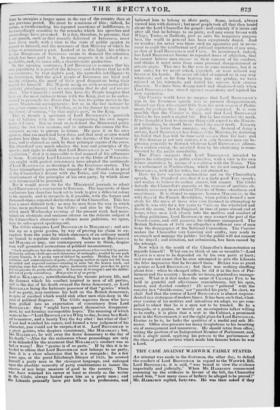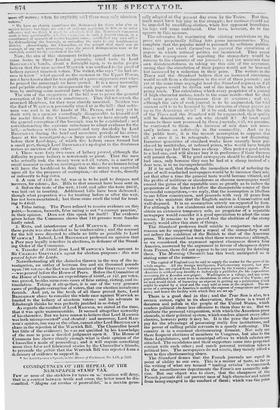THE CASE AGAINST WARWICK FAIRLY STATED.
AN attempt was made in the Scotsman, the other day, to defend the conduct of Lord BROUGHAM in regard to the Warwick Bill. Lord BROUGHAM, it is said, " was bound to view the evidence impartially and judicially." When Mr. HARRISON commenced summing up the evidence in favour of the bill, the Chancellor asked him, " how many cases of bribery be alleged to be proved?" Mr. HARRISON replied, forty-two. He was then asked if they were nil Testers; when he explicitly sail there were only nineteen voters.'
.' We have no charity (continues the Seoisnorn11 for those who Q'Ve. ur receive 1111.7(.4; but there are rules vvou.rice al.p.wathe to this as to other ofki,ces ; we thilih it inu,t .; tl.et Ali. stat,:ment wade it very yo,tionalde, wL but e e rur lqa to ,lich a limited extent, in a constituency of upwards of twelve hundred voter, cstablishol any cze.e for disfranchising the borough, or extending the right to any neighbom jog district. Accordingly, the Chancellor, on the ground that there was no example of any such proceeding when the proved delinquencies were so far curtailed, moved for the rejection of the
Now, the aim of this statement (which appeared almost in the same terms in three London journals, noted tools in Lord BROUGH IM'S hands, about a fortnight ago), is to make people believe that the ease against Warwick was confined to the proof of bribery against nineteen seem. The writer, who says " he ball ac-
cess to know " what passed on the occasion in the Upper House, must have known that he was guilty of a gross suppressio ved when
he penned the paragraph we have quoted. It is a most unworthy and palpable attempt to misrepresent the real state of the ques- tion, by omitting some material facts which bear upon it. The aim of the supporters of the bill was to prove the general corruption of the Warwick constituency. They did not attack the returned Members, for they were already unseated. Neither was the Earl of WARWICK personally aimed at in the bill : that noble- man was and is in the hands of Mr. PETER, and may yet be dealt with in a manner exceedingly disagreeable to himself and his useful frieed the Chancellor. But, as we have already said, the general corruption of the borough was to be established : and
notwithstanding the extreme reluctance to admit evidence for the bill;—reluctance which was manifested very decidedly by Lord BRouereem during the brief and uncertain periods of his atten- elance at the investigation,—a large mass of evidence was laid before- their Lordships, of which the bribery cases formed but a small part, though Lord 13R017GIIAM'S apologist in the Scotsman makes no mention of any other.
1. There were forty-two cases of bribery proved, although the difficulty to prove bribery is notoriously so great. That the men who actually took the money were not all voters, is a matter of small moment in such an investigation as this ; for no human being will have the hardihood to deny that the money was expended upon all for the purposes of corruption,—in other words, directly or indirectly to buy votes. 2. A sum of 513/. 4s. 9d. was or is to be paid to drapers and mercers, for colour:, &c. Bills to that amount have been sent in.
3. Before the teste of the writ, 11601. and after the teste 20831., was laid out in treating. Additional bills have been delivered; though what proportion was for treating before or after the writ, has not been ascertained ; but these sums swell the total for treat- ing to 4464/.
4. False rating. The Peers refused to receive evidence on this point,—because, forsooth, false rating is not "a corrupt practice,' in their opinion. Does not this speak for itself? The evidence given before the Commons shows that 140 persons were fraudu- lently rated.
5. Riots, and interference of Lord WARWICK. Evidence on these points was also decided to be inadmissible ; and the counsel for the bill were directed to allude as little as possible to Lord WARWICK! Indeed, Lord BROUGHAM professed an opinion that a Peer may legally interfere in elections, iu defiance of the Stand- ing Order of the Commons.
6. Transfer of 31001. from Lord WARWICK'S bank account to Sir CHARLES GREY ILLE'S agent for election purposes : this teas proved before the Lords.
Notwithstanding all the obstacles thrown in the way of the in- vestigation, an outlay of between five and six thousand pounds
upon 700 voters—for that was the number of the GREvis LE voters —was proved before the House of Peers. Before the Committee of the House of Commons, an expenditure of 8500/., or 12/. per voter,
was proved, besides numerous cases of false rating, rioting, and in- timidation. Taking it altogether, it is one of the very grossest cases of profligate corruption of voters, that our election annals can furnish. And yet, in the teeth of all these proved facts, Lord Exotica-teat chose to consider the whole case against Warwick as limited to the bribery of nineteen voters; and his advocate in Edinburgh thinks he was perfectly justified in so doing! As regards the conduct of Lord RADNOR, we stated at the time, that it was quite unaccountable. It seemed altogether unworthy
of his character. But we have reason to believe that Lord RADNOR Was both misrepresented* and cheated: and moreover, Lord Rep-
rice's opinion, one way or the other, cannot alter Lord BROUGHAM'S share in the rejection of the Warwick Bill. The Chancellor heard but little of the evidence; he was not qualified by his knowledge of the case to pass a decided judgment upon it. The House of Commons has shown clearly enough what is their opinion of the Chancellor's mode of proceeding; and it will require something more than false and fabricated stories by the Chancellor's friends, to persuade the public that the Warwick Bill was rejected from a deficiency of evidence to support it.
• See Lord R•psoa s Speech, in the Mirror of Parliament, No. LIX. p.3223.





















 Previous page
Previous page